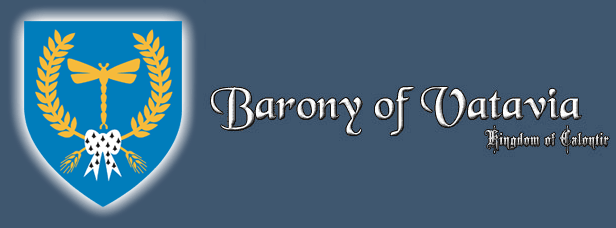
Macbeth
by Friar Thomas Bacon (David Moreno)
Orignally published in the January 1999, A.S. XXXIII issue of the Dragonflyre, a publication of the Barony of Vatavia.
One of the most infamous kings of Scotland is Macbeth, based solely on Shakespeare's play of the same name. But Shakespeare was more interested in telling a tale then relating history. In fact, all his histories can be easily categorized as "docu-dramas". The short essay that follows attempts to return Macbeth to history proper and give a more balanced view of this king.
Macbeth, born in 1034, was the grandson of King Kenneth II and married Gruoch, the granddaughter of King Kenneth III. From his father Findlaech (named Sinal in the play), Macbeth acquired the title of moarmaer (chief) of a region of Moray in northern Scotland.
While Macbeth did gain the throne by killing Duncan, on August 14, 1040, but it was on a battlefield near Elgin, not by assassination. Shakespeare's chief source of this tale was Holinshed's "Chronicles". In this account, Macbeth, with the help of Banquo, murders Duncan, but the details are not given. In this gap Shakespeare places the circumstances in the killing of an earlier king: Duff. Shakespeare omitted the detail of Banquo's assistance, as Banquo is the reputed founding ancestor of the Stuarts, of whom James just took the throne of England.
Macbeth secured his hold by defeating a rebel army in 1045 near Dunkeld. It has been suggested that this battlefield was the inspiration for Birnam Wood as there was nearby a village named Birnam. The following year, Macbeth fended off an attempt by Siward, the Earl of Northumbria, to place the son of Duncan, Malcolm, on the throne. The next eight years were quiet, and Macbeth spent 1050 on pilgrimage to Rome. In 1054, Siward successfully forced Macbeth to yield parts of southern Scotland to Malcolm. Three years later, Malcolm had his revenge by killing Macbeth in battle, one day and seventeen years after Macbeth had killed Duncan. (Shakespeare makes no mention of the passage of time, and moves the action along such that seems that it took less then seventeen years to happen. Another example of dramatic compression of time.)
With the exception of the murder, Shakespeare follows fairing closely the plot-line in the "Chronicles", including the Weird Sisters. He makes one significant change and that is in the nature of Macbeth's character. In the "Chronicles", Macbeth is ruthless, capable and self-confident. In the play, Macbeth is none of these, driven by outside forces, alternating between remorse and self-doubt. This was done to fit the moral theme of the play, and to cater to King James biases.
Macbeth was buried on Iona as a legitimate king. His stepson, Lulach, continued to resist Malcolm, but perished on March 17 the following year. Malcolm ruled for thirty-five years. Banquo's descendants became part of the royal line by one of them marring Robert the Bruce's son.
Macbeth has on last obscure role in Scottish history. It is an enduring legend that the piece of rock that Edward I sent to London in 1296 was not the Stone of Scone and that he was given a fake, the true Stone being hidden somewhere in Scotland. One of the reputed places the Stone was hidden was Macbeth's hill fort at Dunnsinnan. The legend does not state why here, but though most of the 19th century numerous excavations were undertaken there, as well as reports of an underground chamber being uncovered and then lost in which the Stone was supposedly seen. There are reports of a stone being taken from the site. Whether the Stone was ever was or still is there is one of those abiding mysteries of history.
The true nature of Macbeth's character is lost in the mists of time. He certainly not the villain as portrayed by Shakespeare, though still not a pleasant man. In all likelihood he was not different then any other ambitious and powerful man of his time, such as William the Conqueror or Henry IV of Germany. It is a truism that the victors write the history, and Macbeth had the misfortune to be a loser like that other great villain of Shakespeare: Richard III.
Bibliography
The College Survey of English Literature. New York: Harcourt Brace & Co., 1945. pp. 329-335.
Evans, G. Blakemore, ed. The Riverside Shakespeare. Boston: Houghton Mifflin Co., 1974. pp. 1306-1311
Gerber, Pat. Stone of Destiny. Edinburgh: Canongate Books, 1997
"Macbeth." Encyclopedia Britannica. ed. 1986. Vol. 7, pp. 607-608.
Copyright © 1997 - present His Lordship Friar Thomas Bacon (David Moreno). All rights reserved.